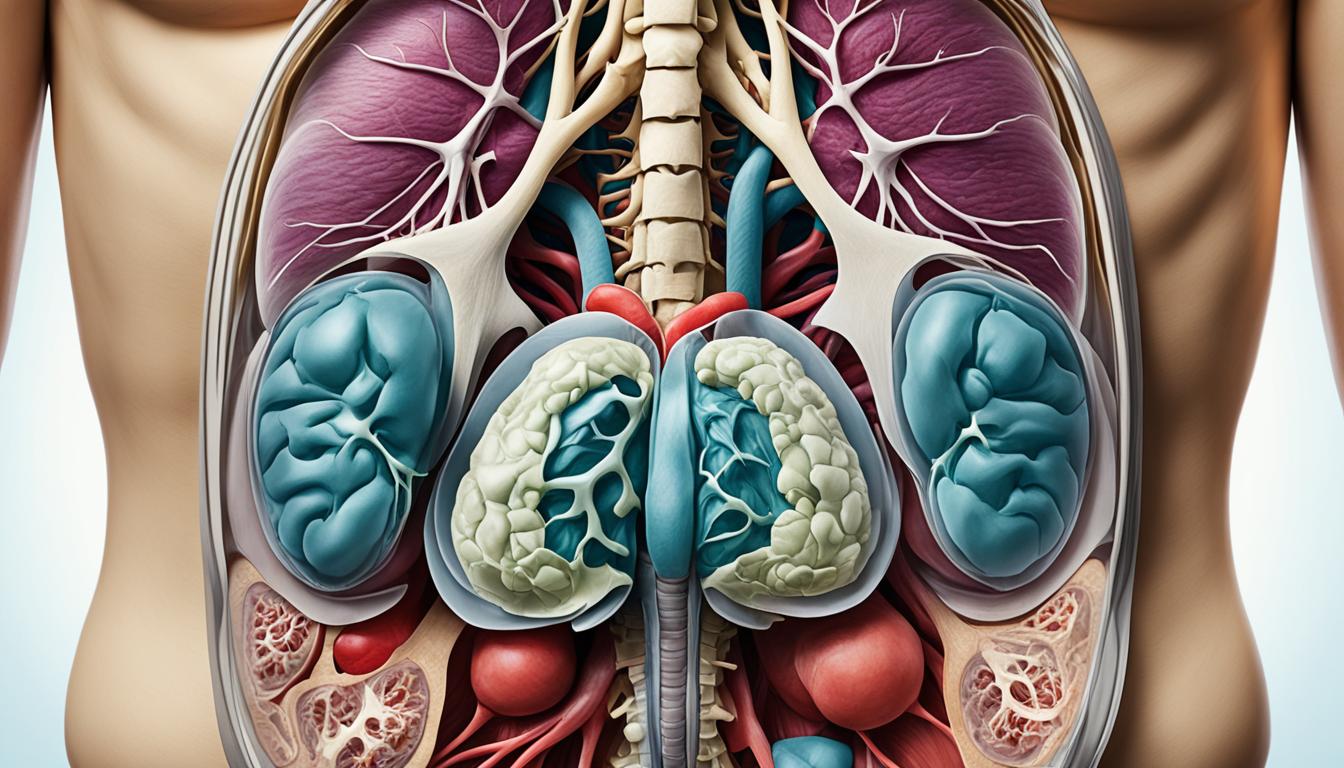The spleen is key for blood filtering. It makes white blood cells and stores red blood cells and platelets. An enlarged spleen, or splenomegaly, can happen because of different reasons. These can be blood disorders, issues with blood flow, some cancers, or metabolic diseases.
Spotting the symptoms of an enlarged spleen early is important. This includes feeling pain in your stomach area, getting full quickly after eating, and having hiccups. Doctors usually find an enlarged spleen through exams and tests. They use tools like ultrasound, CT scans, and MRIs.
Treatment options for a swollen spleen vary. Sometimes, you might get medicine to help with the symptoms. But in more serious cases, doctors may have to remove the spleen. However, taking out the spleen can make you more likely to get certain infections. That’s why getting shots to prevent these infections is crucial.
An enlarged spleen can lead to dangerous problems like bleeding if it bursts. You might also get sick more often. While not all cases of splenomegaly can be stopped, some steps can lower your risk. Drinking less alcohol and keeping up with good hygiene are smart moves.
Stem cell therapy is a new and exciting way to possibly treat an enlarged spleen. It uses stem cells to try and help the spleen work better. This gives hope to people with this condition.
Key Takeaways:
- Enlarged spleen, known as splenomegaly, can be caused by various factors, including blood disorders, decreased blood flow, cancer, and metabolic diseases.
- Common symptoms of an enlarged spleen include abdominal pain, fullness after eating, and hiccups.
- Diagnosis involves a physical examination and imaging tests such as ultrasound, CT scan, or MRI.
- Treatment options depend on the underlying cause and may include medication or surgical removal of the spleen.
- Complications of an enlarged spleen can include rupture and an increased risk of infections.
- Prevention strategies for splenomegaly involve avoiding excessive alcohol consumption and practicing good hygiene.
- Stem cell therapy is being explored as a potential treatment option for some cases of splenomegaly.
Causes and Symptoms of Enlarged Spleen
An enlarged spleen is called splenomegaly. It has various causes and shows certain symptoms. Knowing what causes it and its signs helps doctors diagnose and treat it well.
Causes of Enlarged Spleen
There are four main causes for an enlarged spleen:
- Blood disorders: Hemolytic anemia and sickle cell disease are types of blood disorders. They can make the spleen bigger. These problems cause blood cells to break down abnormally, leading to an enlarged spleen.
- Decreased blood flow: Liver issues like cirrhosis can also enlarge the spleen. They cut down on blood flow. A liver that doesn’t work well can affect blood circulation and cause the spleen to grow.
- Cancer: Diseases like leukemia and lymphoma can spread to the spleen. This makes it larger. The growth happens because cancer cells attack the spleen.
- Metabolic diseases and infections: Conditions such as Gaucher disease and malaria can make the spleen big. These issues interfere with spleen functions, causing it to swell.
Symptoms of Enlarged Spleen
Noticing symptoms of an enlarged spleen can lead to early diagnosis and care. Signs of this condition include:
- Abdominal pain: Feeling pain in the upper left abdomen often points to an enlarged spleen.
- Fullness after eating: Many find they don’t need to eat much to feel full if their spleen is enlarged.
- Hiccups: Hiccups that won’t go away can signal an enlarged spleen, especially if other symptoms are present.
- Fatigue: When your spleen is big, it can make you very tired and weak.
- Frequent infections: An enlarged spleen can lower your body’s ability to fight off sickness.
Some people may have an enlarged spleen without any symptoms. So, regular medical exams are key to finding and treating it early.
Diagnosis, Treatment, and Complications of Enlarged Spleen
Finding an enlarged spleen starts with a check-up and imaging tests like ultrasound and MRI. These let doctors study the spleen’s size and shape. They can spot any problems or reasons behind it.
The treatment depends on what’s causing the spleen to grow. If it’s not too big and not causing issues, the doctor might just watch and check it over time. When the cause is known, they may give you drugs to help with symptoms or swelling. Sometimes, they might even need to take it out. But remember, removing the spleen can make you more likely to get sick. So, you’ll probably need some shots to help protect you if you have surgery.
An enlarged spleen may lead to dangerous issues like it bursting. This can cause heavy bleeding and is a serious risk. People with a big spleen should be careful, avoiding rough sports or activities. If you get a sharp pain in your belly or feel very sick, get help right away as this could be a sign of a burst spleen.
Doctors are also looking into new ways to treat a swollen spleen, like with stem cell therapy. This method uses stem cells to repair the spleen. Even though it’s not widely used yet, it’s showing good promise. This could be a big step forward in how we treat enlarged spleens.

